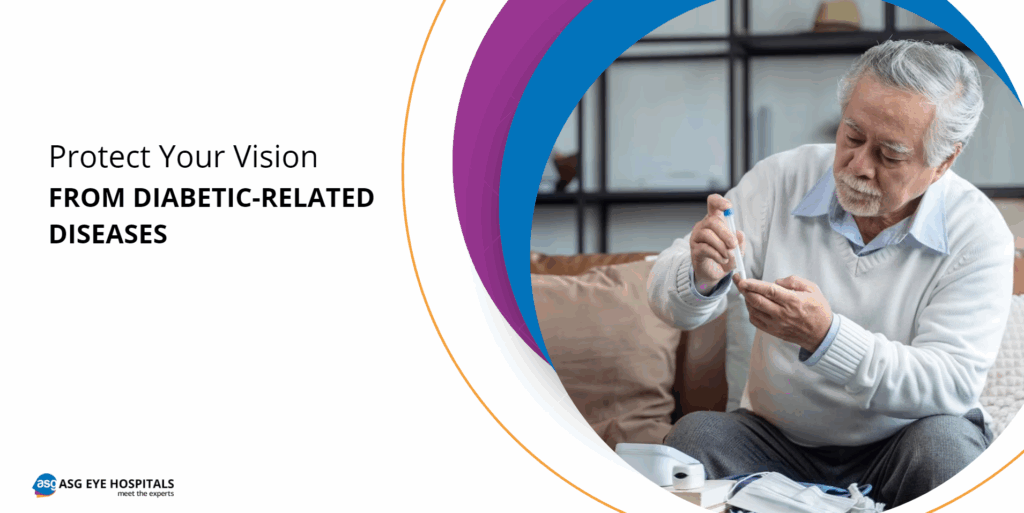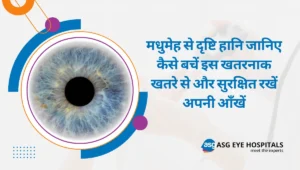The human eye is an intricate and delicate organ, and for those managing diabetes, the risk of retinal damage is a sobering reality. Diabetes can impact various organs, including the eyes, leading to a condition known as diabetic retinopathy. However, there is hope. By adopting proactive measures and making lifestyle changes, you can take significant strides in protect your retina and preserving your precious eyesight from Diabetes .
Diabetic Retinopathy
Diabetic retinopathy is a serious complication of diabetes that affects the blood vessels in the retina. Elevated blood sugar levels can cause damage to the small blood vessels, leading to leakage, swelling, and the growth of abnormal blood vessels. Left untreated, diabetic retinopathy can result in vision loss and even blindness.
Tips to Protect Your Retina from Diabetes
- Regular Eye Exams: Schedule regular comprehensive eye exams with an ophthalmologist. Early detection of diabetic retinopathy is crucial for effective treatment. These exams can help identify potential issues before they escalate.
- Blood Sugar Control: Maintain tight control over your blood sugar levels. Consistently high blood sugar can accelerate the progression of diabetic retinopathy. Work closely with your healthcare team to establish a diabetes management plan that works for you.
- Blood Pressure Management: High blood pressure can exacerbate diabetic retinopathy. Keep your blood pressure in check by adopting a healthy lifestyle, including a balanced diet, regular exercise, and, if necessary, medication as prescribed by your doctor.
- Healthy Lifestyle Choices: Adopting a healthy lifestyle can positively impact your overall health and, consequently, your eye health. Include a variety of nutrient-rich foods in your diet, exercise regularly, and avoid smoking, as it is known to worsen diabetic retinopathy.
- Eye-Friendly Nutrients: Certain nutrients support eye health, such as omega-3 fatty acids, lutein, zeaxanthin, and vitamins A, C, and E. Incorporate foods rich in these nutrients, such as leafy greens, fish, nuts, and colorful fruits and vegetables, into your diet.
- Monitor Cholesterol Levels: High cholesterol levels can contribute to vascular problems, including those affecting the eyes. Manage your cholesterol through a combination of dietary changes, regular exercise, and, if necessary, medications prescribed by your healthcare provider.
- No cigarettes: Smoking is a significant risk factor for diabetic retinopathy. If you smoke, seek support to quit. Quitting smoking can have a positive impact not only on your eyes but also on your overall health.
- Stay Hydrated: Proper hydration is essential for overall health, including eye health. Ensure you drink an adequate amount of water daily to support the proper functioning of your body, including your eyes.
Diseases Related to Diabetic:
- Diabetic Macular Edema (DME): This is a specific complication of diabetic retinopathy where there is swelling in the macula, the central part of the retina responsible for sharp, central vision. DME can lead to vision loss if not treated.
- Proliferative Diabetic Retinopathy (PDR): In the advanced stages of diabetic retinopathy, new abnormal blood vessels can form on the surface of the retina. These fragile vessels can bleed into the vitreous, the gel-like substance that fills the back of the eye, causing vision problems and even blindness if left untreated.
- Macular Ischemia: In some cases, diabetic retinopathy can lead to reduced blood flow to the macula, resulting in macular ischemia. This can contribute to vision loss and impairment.
- Vitreous Hemorrhage: Abnormal blood vessels in proliferative diabetic retinopathy can bleed into the vitreous, causing sudden vision loss. The blood may clear on its own, but severe cases may require intervention.
- Retinal Detachment: Scar tissue that forms as a result of diabetic retinopathy can pull the retina away from the back of the eye, leading to retinal detachment. This is a serious condition requiring prompt medical attention to prevent permanent vision loss.
- Neovascular Glaucoma: Abnormal blood vessels in the eye can interfere with normal fluid drainage, leading to increased intraocular pressure and the development of neovascular glaucoma. This condition can cause severe pain and vision loss.
Conclusion:
Taking steps to protect your retina from diabetes-related damage requires commitment and a proactive approach to managing your overall health. By incorporating these lifestyle changes and working closely with your healthcare team, you can significantly reduce the risk of diabetic retinopathy and protect your vision for the future. Remember, your eyes are a precious gift—take the necessary steps to cherish and protect them.




